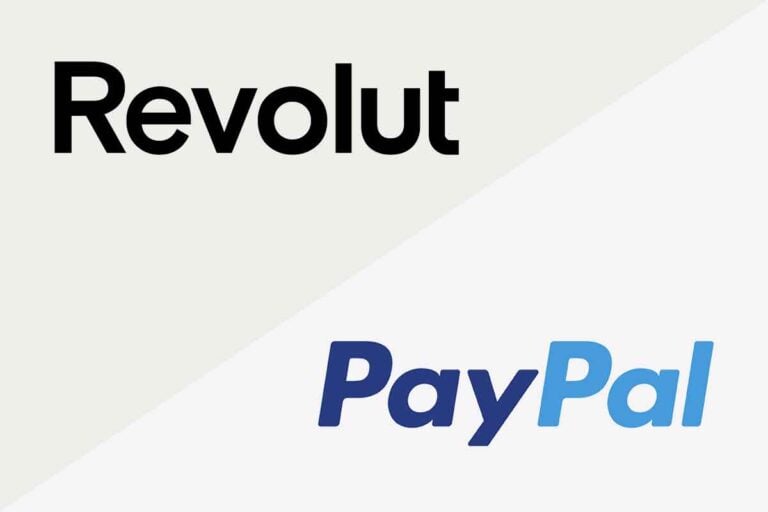Business banking has evolved significantly in the last decade, with a shift from traditional high-street banks to more flexible and innovative digital alternatives. Revolut vs PayPal are two leading platforms that have transformed the business banking landscape. In this comparison, we will examine the features, costs, and unique selling points of both to help you choose the right banking partner for your business needs.
Revolut vs PayPal
| Feature | Revolut | PayPal |
|---|---|---|
| Multi-currency accounts | Supports 30+ currencies | Supports major currencies |
| Card payments | Worldwide acceptance via MasterCard or Visa | Accepted by millions of businesses worldwide |
| International transfers | Free; real exchange rates | Fee charged; conversion rates may apply |
| Mobile app | Full-featured app for iOS & Android | Full-featured app for iOS & Android |
| Invoicing | Free, customisable invoices | Free, customisable invoices |
| Instant notifications | Real-time transaction alerts | Real-time transaction alerts |
| API integration | Comprehensive API for business integrations | Not available |
| Bulk payments | Supported | Not supported |
| Expense management | Advanced expense management tools | Basic tools available |
| Payroll functionality | Supported | Not supported |
| Cryptocurrency support | Buy, sell, hold & transfer in-app | Buy, sell, hold & transfer in-app |
| Savings vaults | Available in multiple currencies | Not available |
| Virtual cards | Available for secure online payments | Not available |
| Budgeting tools | Advanced budgeting & analytics tools | Basic tools available |
| 24/7 customer support | Available via in-app chat | Available during business hours |
| Subscription billing | Supported | Supported |
| Loans | Not available | Business loans available |
| FDIC Insured | Not available | Available up to $250,000 |
| Physical cheque deposit | Not available | Available |
| Business debit card | Available | Available |
 | Tide Business Bank Accounts ✓ Free, Plus, or Pro Account ✓ iOS & Android Mobile App ✓ Upload & Auto-Match Receipts Pricing Trial period Contact | |
 | Card One Money ✓ No Credit Checks ✓ Simple Fees ✓ Up To 3.5% Cashback Pricing Trial period Contact | |
 | ANNA Money ✓ Apply In 10 Minutes ✓ Bookkeeping & Payroll Tools ✓ User-Friendly Mobile App Pricing Trial period Contact | |
 | HSBC Business Banking ✓ Business Current Account ✓ In-Branch, Online & App Banking ✓ FSCS Protected Pricing Trial period Contact | |
 | Metro Business Banking ✓ Business Current Account ✓ High Street Presence ✓ FSCS Protected Pricing Trial period Contact | |
 | Mettle Business Banking ✓ Business Bank Account ✓ Online & App ✓ Quick & Easy Application Process Pricing Trial period Contact | |
 | Monzo Business Banking ✓ Business Current Account ✓ Dedicated mobile app experience ✓ FSCS Protected Pricing Trial period Contact | |
 | Virgin Money ✓ Business M Account ✓ In-Store, Online & App Banking ✓ Insights & Forecasting Platform Pricing Trial period Contact |
Revolut
Revolut, founded in 2015, is a digital banking alternative designed for individuals and businesses looking for seamless, low-cost banking and financial management. It offers comprehensive features catering to diverse needs from basic transactions to sophisticated financial planning and analysis.
Pros and cons
Pros
- Highly competitive foreign exchange rates.
- No fees for international money transfers.
- Extensive range of features like bulk payments, expense management, and payroll functionality.
- Excellent API integrations for smooth business operations.
- Robust budgeting tools for efficient financial management.
- 24/7 customer support.
Cons
- No loan products available.
- Not FDIC insured.
- Physical cheques cannot be deposited.
Fees and charges
| Fees | Charges |
|---|---|
| Monthly Fee | From £7 to £25 |
| Card payment in the UK | Free |
| International card payment | Free |
| ATM withdrawal | Free up to £200/month, then 2% |
| Foreign currency exchange | Free up to £5,000/month, then 0.5% |
| Inbound transfers | Free |
| Outbound transfers | Free |
Unique and standout features
Revolut’s standout features lie in its ability to provide extensive financial management tools and offer low-cost international transactions.
The platform provides automated expense management and subscriptions tracking, making it easy to maintain a comprehensive view of your financial activity.
Its API integration is beneficial for businesses with unique requirements, enabling them to customise their financial processes efficiently.
Moreover, its provision of multi-currency accounts with real exchange rates is a boon for businesses dealing with international transactions.
PayPal
PayPal, a global leader in digital payments, offers a suite of features tailored for businesses. From secure online transactions to business loans, PayPal is designed for businesses of all sizes, offering scalability, reliability, and worldwide recognition.
Pros and cons
Pros
- Widespread recognition and acceptance globally.
- Provision of business loans.
- FDIC insured.
- Acceptance of physical cheque deposits.
Cons
- High fees for international transactions.
- Limited features for complex financial management.
- Lack of 24/7 customer support.
Fees and charges
| Fees | Charges |
|---|---|
| Monthly Fee | None |
| Domestic sales | 2.9% + $0.30 per transaction |
| International sales | 4.4% + fixed fee based on currency per transaction |
| ATM withdrawal | $1.50 |
| Foreign currency exchange | Varies |
Unique and standout features
PayPal’s strength lies in its widespread acceptance and trusted brand name, making it easier for businesses to receive payments from customers globally.
The platform also offers business loans, helping firms access capital for growth or cash flow management.
Furthermore, the FDIC insurance offers peace of mind to businesses that their money is secure.
Conclusion – Revolut vs PayPal
Choosing between Revolut and PayPal for business banking depends on your company’s specific needs.
If your business requires comprehensive financial management tools and low-cost international transactions, Revolut is the better choice.
Conversely, if brand recognition, availability of business loans, and the safety of FDIC insurance are your priorities, PayPal would be more suitable.
FAQ
Revolut offers better foreign exchange rates and no fees for international transfers, making it more cost-effective for international transactions.
PayPal offers business loans, while Revolut does not currently provide this service.
Revolut offers 24/7 customer support, while PayPal’s customer service is not available round the clock.
PayPal is FDIC insured, offering coverage up to $250,000. Revolut, however, is not FDIC insured.
PayPal accepts physical cheque deposits, but Revolut does not have this functionality.
Revolut offers more sophisticated financial management features like budgeting tools, expense management, and payroll functionality.

